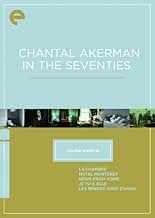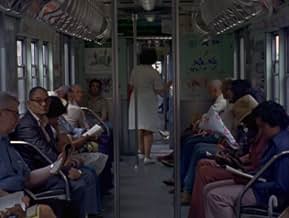News from Home
- 1976
- 1h 29m
Impersonal and beautiful images of Akerman's life in New York are combined with letters from her loving but manipulative mother, read by Akerman herself.Impersonal and beautiful images of Akerman's life in New York are combined with letters from her loving but manipulative mother, read by Akerman herself.Impersonal and beautiful images of Akerman's life in New York are combined with letters from her loving but manipulative mother, read by Akerman herself.
- Director
- Writer
- Star
- Director
- Writer
- All cast & crew
- Production, box office & more at IMDbPro
Featured reviews
As for this film, it's an interesting experiment, if far from Akerman's most important.
It's all images of New York City, mostly still at first, with ever more movement as it goes along. The soundtrack is all letters to Ackerman from her mother in France being read aloud over the images. Odd as it sounds, it easily held my attention, though never really got emotionally involving. Once again, Akerman's city images are great, evoking Edward Hopper's paintings. But both the images and overall impact seem less powerful to me than Akerman's somewhat similar - and to my taste far better -- 'Hotel Monterey'.
However with this kind of experimental film, everyone is likely to react differently, and I'd urge you to see it for yourself.
On one hand is the massive city, New York before the makeover in all its brownstone squalor and sleepy routine. The whole film is a series of languid pans of the camera, they capture people waiting in subway stations, a black woman sitting outside on a chair, kids playing in a fire hydrant, street views and Bronx projects, coming and going. If like me, you're drawn to films that wander, you'll be exhilarated to see this.
On the other we have letters that Akerman's mother sent to her while she was in New York as a young girl, she reads these to us in quiet voice-over. She has such a soothing, calm voice. A mother who worries like all mothers do, who wants to know how she's doing, complains that she never writes back, tells about her health and how the store is doing and who got married to whom and that the heat is making her listless.
It's a quietly captivating thing, all in the contrast of exchange between a city that is cold and nameless, vast, and a glad voice from a faraway home that whispers news, love and worries. At one point the engine noise of cars in a four-lane boulevard drowns out a letter being read.
It swims from loneliness to familiarity, because it's all a part of it. And I'm reminded again of how I love seeing America through European eyes. I rank it up there with Varda's Documenteur (it's LA there) as views I'll carry with me, another Belgian, another spirit that wanders freely.
It ends with a long unbroken shot of Manhattan from a ferry vanishing in the distance with seagulls flying overhead. Forget about 'experimental' and 'minimalism', the shots being geometric or not; that's just the brush. A summer was lived.
It's a far piece from the world of Kenyon & Mitchell, but Akerman is not filming events where the attendees might hope to see themselves in a theater. I watched this movie and tried to figure out where each shot was taken. I think I was pretty successful. That game, however, did not take up the whole of the 85 minutes of the movie, and what was someone who was not an adult in Manhattan in the 1970s supposed to do? After ten or fifteen minutes, I decided that the audience was supposed to make of this a portrait of the recipient of the letter, an individual whose mother thinks she is hungry for news of the family, who never writes about whether she is happy or has made any friends (inference: she isn't and hasn't), and the shots are of her world in New York: first downtown near the River, then a long sojourn in the Times Square Subway Station and finally a ten-minute shot from the stern of the Staten Island Ferry setting out of Manhattan.
I think that with this movie, Akerman is trying to rewrite the relationship between film maker and audience. A film maker makes a film that tells a story, and the audience is the perceptive receiver of that tale, whether it is fiction or fact. We infer plot from the course of actions, from the changes in the personality, status, and relationships of the characters. We derive character from the way in which individual performers differ from the stereotyped roles. What, however, are we to make when you don't see the performer, don't hear her voice, except as a hurried reader of letters?
Well, the stereotypical responses fall neatly into two types. The first type says "Dagnabit! I came here to see a movie with interesting characters and a story! This is awful!" The second says "Ahah, this is new and interesting technique. I get what the auteur is trying to do, and approve, because that makes me a smarter, more percipient viewer." Which are you?
As for me, my reaction is "Interesting technique, but I'd prefer a little more effort from the film maker than forcing me to either fall asleep or make up my own story out of rags and tags." That's because I don't insist on a purely conventional story, but rather than being such an intelligent viewer that I get exactly what Akerman is trying to do, I'd like to have some character.
Then there's the other core element of 'News from home,' the voiceovers of filmmaker Chantal Akerman. As she reads letters that she had received from her mother we also get a small taste of life in Belgium at the time, and especially of the friends, family, and neighbors that Akerman herself had known. More than that - as the letters date to the period when Akerman had lived in New York, often traversing these very streets and subway lines, we are party in some measure to the relationship between her and her mother. The title becomes not just a moment captured in time of the city, but a reflection on a parent's love for their child, of wistfully missing someone who is far away, and in the very least of thinking of Home when we've gone far afield. (Or perhaps, too, a peek at the unspoken disparity between the perspectives of parent and child.) Thus is an air of fond remembrance infused into the presentation, a gentle warmth that couples neatly with the nostalgia of writing letters and the audiovisual visitations to this one time and place. The result is plainly lovely, bewitching, and even heartwarming to some degree. Why, there's almost a sense of whimsy to it all; one can readily imagine a work of fantasy or science fiction that adopts the same tack, showing us a distant world or landscape while letters from home provide a kernel of living, breathing story, whether it's a fragment of narrative or, as in this case, soft emotional context. That such feelings can be evoked by these eighty-eight minutes speaks very well to the power of cinema generally and, here, to the underappreciated genius of Akerman as a filmmaker.
I'll be honest: I love this. Plainspoken as any one-line synopsis is I didn't truly know what to anticipate, but in no time at all after I sat to watch I came to adore it. Many are the movies that have been made about someone moving to The Big City, and missing home, and all the goings-on or misadventures they might get up to in that scenario, but such fare is always embellished for effect, whether comedic or dramatic. Inasmuch as there could be a comparison to such fictional works 'News from home' is much the same concept, except it's perfectly Real and Authentic, and stirs the viewer's thoughts and feelings with that genuineness alone. Outwardly unsophisticated as the craft may be, the skill, intelligence, and care that went into it is indisputable, and the end product speaks for itself. This film is a pleasure. I vaguely assumed I'd appreciate it just for Akerman's involvement alone, and still I'm so very happy with how excellent it really is. By all means I can understand how this won't appeal to all, though as far as that goes the premise should be all the fair warning needed to turn away those who aren't receptive. Yet for viewers who enjoy the quiet, thoughtful side of the medium, or those who find joy in the mundane, I can't overstate what a great treasure this is. 'News from home' is a sublime picture that strikes a rather unique but meaningful chord, and I'm glad to give it my very high, hearty recommendation.
Did you know
- TriviaWhen Akerman's mother writes her father lost 300,000 francs due to a client's bankruptcy, that would equate to about $8,300 at the time or $38,100 in 2019.
- Quotes
Herself - Letter Reader: I received your screenplay. It's well-written, but you know my taste: I find it sad and gloomy. Those people sure have a hard life. It's an important social issue. I hope it will turn out well. The public must be made aware of all this suffering that you young people see so clearly.
- ConnectionsFeatured in What to Watch: Cate Blanchett's Films of Hope (2020)
- How long is News from Home?Powered by Alexa
Details
- Release date
- Countries of origin
- Language
- Also known as
- Briefe von zu Haus
- Filming locations
- Veselka Restaurant, 144 2nd Ave, New York City, New York, USA(newstand outside with awning in Ukrainian)
- Production companies
- See more company credits at IMDbPro
- Runtime
- 1h 29m(89 min)
- Sound mix
- Aspect ratio
- 1.37 : 1























